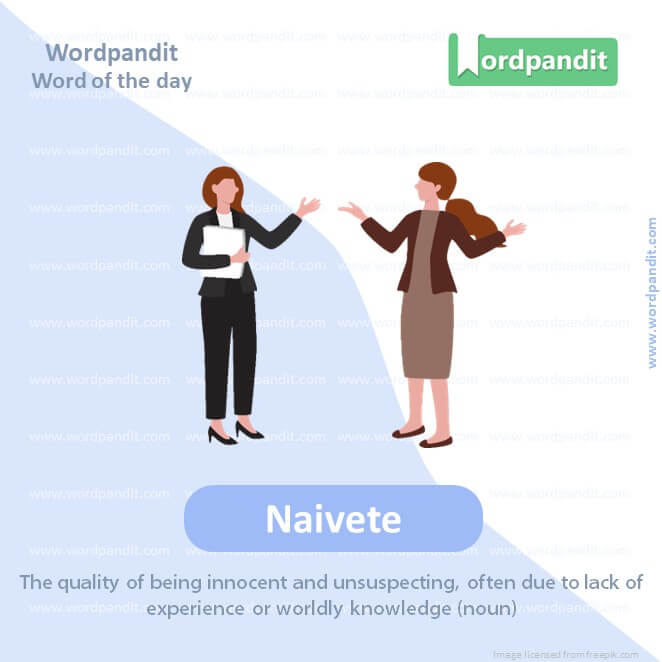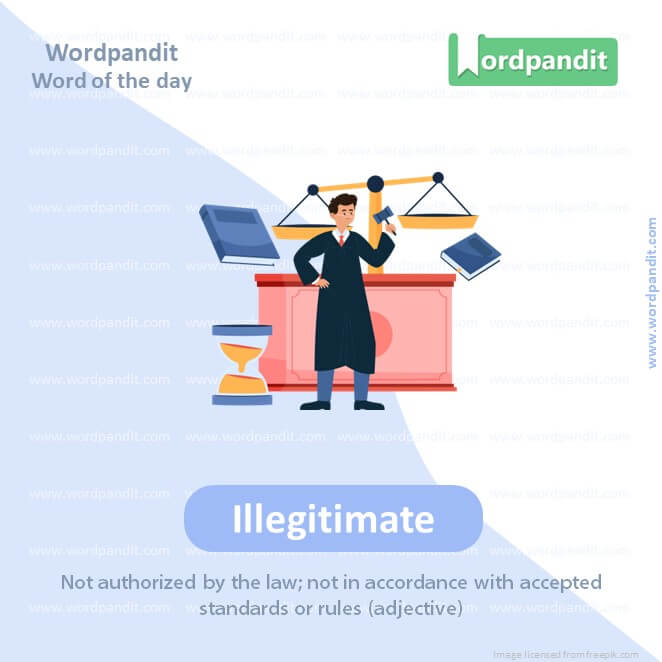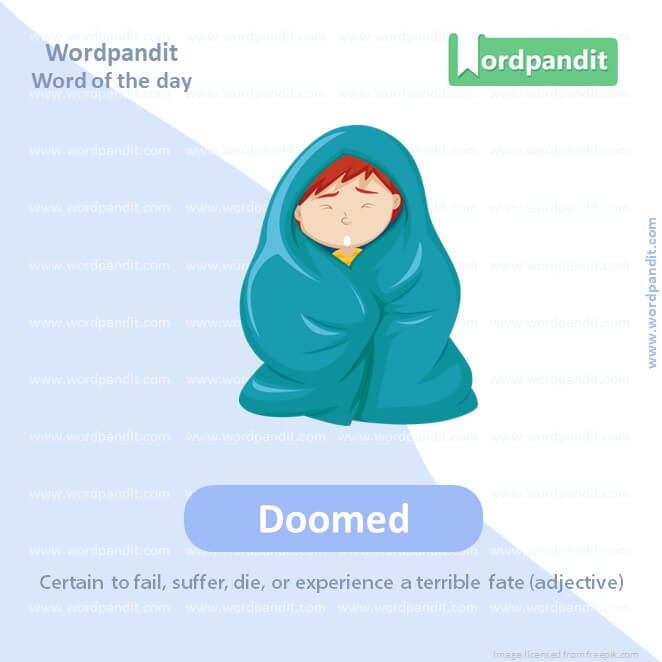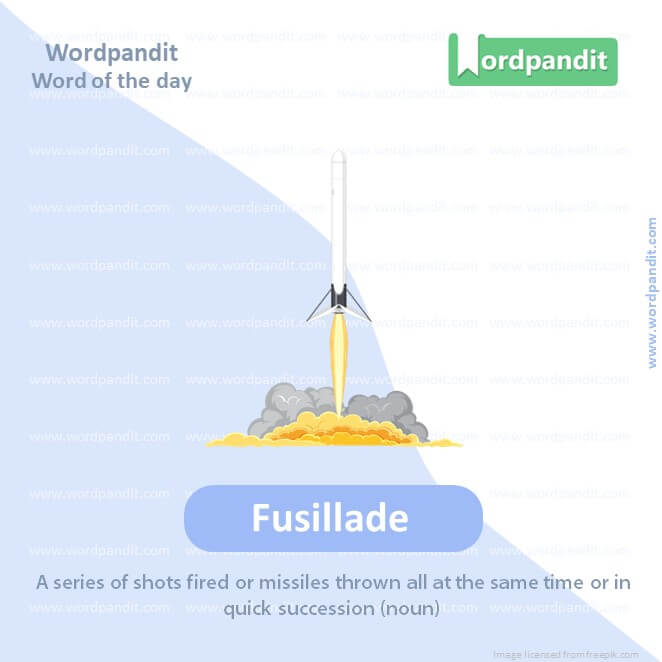Daily Vocabulary Words: List of Daily Used Words in Leading International Newspapers
Hi there. Welcome to this special section @ Wordpandit.
Our endeavour here is very simple: to highlight important daily vocabulary words, which you would come across in leading newspapers in the country. We have included the following newspapers in our selection:
• The New York Times
• The Washington Post
• Scientific American
• BBC
• The Guardian
• Psychology Today
• Wall Street Journal
• The Economist
We are putting in extensive work for developing your vocabulary. All you have got to do is be regular with this section and check out this post on a daily basis. This is your repository of words that are commonly used and essentially, we are posting a list of daily used words. Hence, this has significant practical application as it teaches you words that are used commonly in leading publications mentioned above.
Visit the website daily to learn words from leading international newspapers

WORD-1: Naivete
CONTEXT: Some naive questions are clarifying in their naivete.
SOURCE: Washington post
EXPLANATORY PARAGRAPH: Imagine you have a little brother or sister who trusts everyone and believes everything they’re told, even if it’s a story about flying pigs. That’s kind of like being naive. It means you’re very trusting and maybe don’t understand when people are not being completely honest or realistic.
MEANING: The quality of being innocent and unsuspecting, often due to lack of experience or worldly knowledge (noun).
PRONUNCIATION: nye-eev-TEY
SYNONYMS: Innocence, Simplicity, Ingenuousness, Guilelessness, Unsophistication.
USAGE EXAMPLES:
1. His naivete was evident when he believed the story about the moon being made of cheese.
2. Despite her naivete, she was determined to learn and grow.
3. The child’s naivete brought a sense of joy to the adults.
4. The tourist’s naivete made him an easy target for the street vendors.

WORD-2: Illegitimate
CONTEXT: An objective as patently illegitimate as Russian President Vladimir Putin’s bid to erase.
SOURCE: Washington post
EXPLANATORY PARAGRAPH: Think of a game where you have to follow certain rules. If someone doesn’t play by the rules, it’s like cheating. Illegitimate means something that’s not right because it doesn’t follow the rules or what’s normally accepted.
MEANING: Not authorized by the law; not in accordance with accepted standards or rules (adjective).
PRONUNCIATION: ih-leh-JIT-uh-mit
SYNONYMS: Illegal, Unlawful, Unauthorized, Unofficial, Invalid.
USAGE EXAMPLES:
1. The judge declared the contract illegitimate.
2. He was accused of having an illegitimate claim to the property.
3. The government was formed in an illegitimate manner.
4. She refused to accept the illegitimate results of the competition.

WORD-3: Doomed
CONTEXT: Hamas’s war is not only unjust but also pretty clearly doomed.
SOURCE: Washington post
EXPLANATORY PARAGRAPH: Imagine you built a sandcastle too close to the water. When the tide comes in, the castle will be washed away. This is like being doomed – it means something is sure to have a bad ending or can’t be saved.
MEANING: Certain to fail, suffer, die, or experience a terrible fate (adjective).
PRONUNCIATION: doomd
SYNONYMS: Fated, Condemned, Destined, Ill-fated, Cursed.
USAGE EXAMPLES:
1. The old building was doomed to be demolished.
2. Their plan seemed doomed from the start.
3. The characters in the story were doomed to repeat their mistakes.
4. Without proper care, the endangered species is doomed.
WORD-4: Derailing
CONTEXT: Hamas now intends to settle for a limited goal dramatizing the Palestinian cause and thereby derailing an Israeli-Saudi rapprochement
SOURCE: Washington post
EXPLANATORY PARAGRAPH: Imagine a train running smoothly on tracks. If something makes the train leave its tracks, it’s not going to get to where it’s supposed to go. Derailing is like that – it means causing something to go off course or stop following its plan.
MEANING: Causing to run off its tracks or intended course; diverting from a set plan (verb).
PRONUNCIATION: dee-RAY-ling
SYNONYMS: Diverting, Deflecting, Distracting, Deviating, Disturbing.
USAGE EXAMPLES:
1. The sudden storm was derailing their picnic plans.
2. An unexpected question derailed her from her speech.
3. Their discussion was derailed by a loud noise outside.
4. He was derailing from his original career path.

WORD-5: Albeit
CONTEXT: the kingdom will pursue relations with Israel after the war, albeit possibly with heightened demands regarding concessions for Palestinians.
SOURCE: Guardian
EXPLANATORY PARAGRAPH: Think about when you get a small piece of candy. You’re happy because it’s candy, but it’s still just a small piece. “Albeit” is a word we use to say “although” or “even though.” So, you might say, “I got a candy, albeit a small one.”
MEANING: Used to introduce a phrase that contrasts with what has just been said; equivalent to “although” (conjunction).
PRONUNCIATION: all-BEE-it
SYNONYMS: Although, Though, Even though, Despite being, Notwithstanding.
USAGE EXAMPLES:
1. She accepted the job, albeit with some hesitation.
2. It was a happy day, albeit a bit stressful.
3. The movie was good, albeit a little long.
4. He agreed to come, albeit reluctantly.
WORD-6: Futile
CONTEXT: Hamas’s war is not only futile but also waged by exclusively unlawful means.
SOURCE: Guardian
EXPLANATORY PARAGRAPH: Imagine trying to catch a cloud in a net. No matter how hard you try, you can’t do it because it’s impossible. That’s what futile means – trying to do something that just can’t be done or won’t have any result.
MEANING: Incapable of producing any useful result; pointless or ineffective (adjective).
PRONUNCIATION: FYOO-tile
SYNONYMS: Useless, Vain, Ineffective, Worthless, Fruitless.
USAGE EXAMPLES:
1. Their attempts to change his mind were futile.
2. Arguing about the past seemed futile.
3. It was a futile effort to try and fix the irreparable vase.
4. The team realized their strategy was futile.

WORD-7: Fusillade
CONTEXT: A rocket fusillade fired indiscriminately from Gaza at civilian targets in Israel.
SOURCE: Guardian
EXPLANATORY PARAGRAPH: Imagine a lot of people throwing small balls at a target all at once. Fusillade is like that, but with words or bullets. It’s when many things are fired or thrown rapidly at the same time.
MEANING: A series of shots fired or missiles thrown all at the same time or in quick succession (noun).
PRONUNCIATION: FYOO-sih-lahd
SYNONYMS: Barrage, Volley, Salvo, Bombardment, Hail.
USAGE EXAMPLES:
1. The soldiers launched a fusillade against the enemy.
2. He faced a fusillade of questions from the reporters.
3. The sky was lit up by a fusillade of fireworks.
4. The debate ended with a fusillade of accusations.
WORD-8: Noncombatants
CONTEXT: deaths resulted from Israeli fire, and a very large portion, tragically, were noncombatants, including children.
SOURCE: Guardian
EXPLANATORY PARAGRAPH: In a game of tag, there are people who are “it” and trying to tag others. But imagine some kids who are just watching and not playing. They’re like noncombatants, which means people who are not fighting in a war or battle.
MEANING: People who are not engaged in fighting during a war, typically civilians (noun).
PRONUNCIATION: non-KOM-buh-tunts
SYNONYMS: Civilians, Bystanders, Neutrals, Non-fighters, Non-participants.
USAGE EXAMPLES:
1. The army was careful to avoid harming noncombatants.
2. Aid was provided to noncombatants affected by the war.
3. The treaty protected noncombatants in conflict zones.
4. Noncombatants were evacuated from the war-torn area.
WORD-9: Embedding
CONTEXT: Gazan civilians at risk by embedding its armed militia in homes, schools, and hospitals.
SOURCE: Guardian
EXPLANATORY PARAGRAPH: Think of pressing a sticker onto a page so it sticks and becomes part of the page. Embedding is like that. It means putting something deeply into something else so that it becomes a part of it.
MEANING: Fixing firmly and deeply in a surrounding mass; incorporating or integrating closely (verb).
PRONUNCIATION: em-BED-ing
SYNONYMS: Implanting, Inserting, Ingraining, Entrenching, Engrafting.
USAGE EXAMPLES:
1. Embedding the pole in concrete ensured it would stand strong.
2. The artist enjoyed embedding tiny details in his paintings.
3. Embedding technology in everyday objects is becoming common.
4. The new policy was about embedding sustainable practices in the company.
WORD-10: Renounce
CONTEXT: Israel’s operations without requiring Hamas to leave power or renounce armed struggle.
SOURCE: Guardian
EXPLANATORY PARAGRAPH: Imagine you have a favorite toy, but you decide you don’t want to play with it anymore and give it away. Renouncing is like that. It means to formally say you don’t want to be associated with something or own something anymore.
MEANING: Formally declaring one’s abandonment of a claim, right, or possession (verb).
PRONUNCIATION: re-NOWNSS
SYNONYMS: Abandon, Forsake, Relinquish, Disown, Reject.
USAGE EXAMPLES:
1. He decided to renounce his claim to the throne.
2. To achieve peace, she had to renounce her old grudges.
3. The organization renounced its controversial policies.
4. After much thought, he chose to renounce his citizenship.
vocabulary journey
In the realm of language learning, one unparalleled method has been consistently proven to provide tremendous value – engaging with vocabulary journal words. This practice is a brilliant tool that provides a platform for the gradual introduction of new words, phrases, and their nuances.
But how exactly should we approach learning vocabulary journal words?
Originally, vocabulary journal words are a collection of new words you encounter that are challenging and unfamiliar. On stumbling upon such words, take the first step by writing them down in your journal. But simply recording them isn’t enough. The real strength of vocabulary journal words lies in understanding and using them in context. Draft sentences using these words, as this practical usage not only enhances retention but also familiarizes you with their applicability.
Expanding your vision beyond memorization, indulge in understanding the background of these vocabulary journal words. Dive into the etymology of the words, learn their origins, and uncover the different meanings they’ve held over time. This nugget of information often aids in deeper understanding and long-term retention of words.
Your engagement with vocabulary journal words should not be reserved for solitary learning. Discuss these words in conversation with friends, family, or language mentors. This encourages active usage and, silently but surely, integrates them into your everyday language.
Another enchanting side to vocabulary journal words is the potential for creativity. Create small stories or visuals connected to the words, leading your brain to create multiple neural connections to the meaning of the word – a powerful strategy for enhancing retention.
In essence, vocabulary journal words offer a multifaceted, immersive learning process that goes beyond just enhancing your word-list. They open doors to the dynamic world of language and its contexts, training your mind to appreciate, understand, and effectively communicate with an enriched vocabulary. Consider vocabulary journal words not as a task but as your secret allies on your beautiful journey through language learning.











